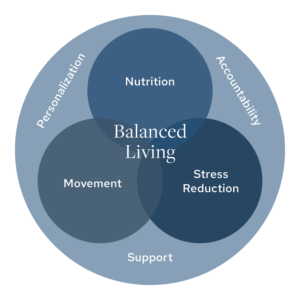“Lose ten pounds fast with this diet.” “Get a flat belly in one week.” “Drop five pounds after doing this workout.” Sound familiar? Maybe you’ve tried one or two of these diets or quick-fix workout routines with the intention of losing a few pounds, but the number on the scale didn’t budge. Or maybe you lost weight, but had trouble keeping it off later on. Drastic diets, calorie restriction, and over-exercising are some of the most common ways to try and lose weight, but more often than not, the results don’t live up to the hype.
Whether you’re trying to lose a significant amount of weight or just want to tone up and feel better about your body, addressing only one element of your lifestyle won’t be enough. Losing weight in a healthy way, and then maintaining it, requires a multifaceted approach. Your nutrition and fitness plans need to align with your health history, environmental conditions, and social context. And, they must also work in conjunction with stress management techniques, an under-recognized factor in maintaining a healthy weight.
It might sound overwhelming to have to address so many areas of your life all at once — and alone, it can be. That’s what the Balanced Living Program at PALM Health is designed to help you with.
 Created by doctors and led by a team of experts in various areas, the 12-week Balanced Living Program addresses the three key aspects of a healthy lifestyle for optimal weight management: nutrition, movement, and stress reduction.
Created by doctors and led by a team of experts in various areas, the 12-week Balanced Living Program addresses the three key aspects of a healthy lifestyle for optimal weight management: nutrition, movement, and stress reduction.
How does nutrition impact weight management?
Food is a central element of culture, social experience, celebration, and self-care. Food is intended to bring pleasure, which your brain and body needs, as well as a sense of comfort and security. However, rewarding yourself with food is often equated to eating unhealthy, processed “junk” foods. These foods can cause inflammation in the body and negatively impact your health.
Your body has a programmed inflammatory response that kicks in when an external threat is detected, such as a cut or a burn. The same response applies when there is an internal threat. Certain foods, like sugar and processed foods, can cause this inflammation within your gut, which in turn makes it harder to lose weight.
When your body experiences inflammation, your cortisol hormone levels increase. The rise in cortisol spikes your blood sugars. The result? You’re hungry throughout the day. Sugar and processed foods can put your body in a cycle: you might eat a lot of them, but biochemically you won’t really be full, so you’ll want to eat more (more on this here).
 Another way your diet influences weight gain is through unhealthy eating patterns, like snacking or emotional eating, which is an over-reliance on food (usually “junk” food) to fill a deeper emotional need. Even if you follow a healthy diet for the most part, falling into emotional eating or nighttime snacking can make it more difficult to lose weight.
Another way your diet influences weight gain is through unhealthy eating patterns, like snacking or emotional eating, which is an over-reliance on food (usually “junk” food) to fill a deeper emotional need. Even if you follow a healthy diet for the most part, falling into emotional eating or nighttime snacking can make it more difficult to lose weight.
Getting stuck in habits like emotional eating or having a diet rich in sugar and processed foods are often the culprits if you’re struggling to lose weight, but sometimes, it can be trickier than that. There may be other foods that cause inflammation in your body, or you could have a sensitivity to a certain food group you didn’t know about that is causing uncontrolled cravings. This is another factor that a physician can help you identify and treat along the way.
PALM’s approach to making dietary changes is rooted in moderation, rather than restriction, because the goal is to create a healthy and productive relationship with food. The food planning process and ongoing support of your provider during the program help you cultivate that healthy relationship with food and create that sustainable change.
At the start of the program, you will work very closely with your provider to examine your previous eating habits and come up with ways to structure your diet going forward. Together, you will explore portion sizes, major food groups to include in your routine, and how to plan your meals without resorting to constant calorie-counting.
The Balanced Living Program uses a cardiometabolic food plan for participants. This food plan was developed by a team of physicians and nutrition professionals with the goal of using food medicinally to address underlying risk factors for weight-linked diseases like cardiovascular and metabolic diseases.
 The cardiometabolic food plan features a modified Mediterranean diet. What does this mean? The Mediterranean diet is rooted in whole, unprocessed foods like fruits, vegetables, whole grains, nuts, legumes, spices, and modest amounts of poultry, red meat, fish, and red wine. This plan is low in simple sugars and high in fiber, with a balanced amount of good-quality fats.
The cardiometabolic food plan features a modified Mediterranean diet. What does this mean? The Mediterranean diet is rooted in whole, unprocessed foods like fruits, vegetables, whole grains, nuts, legumes, spices, and modest amounts of poultry, red meat, fish, and red wine. This plan is low in simple sugars and high in fiber, with a balanced amount of good-quality fats.
The combination of these foods paired with appropriate portion sizing and meal timing can help you reduce inflammation, stabilize blood sugar, consume healthy amounts and types of calories, and provide plentiful energy.
What does your specific meal plan entail? You’ll have the opportunity to choose from 10-15 core options for breakfasts, lunches, and dinners for the first nine weeks of the program. These include meals you can cook at home as well as options from the PALM Café.
After the first nine weeks, your provider will help you expand upon your meal options. Throughout the whole process, however, your provider will be there alongside you not only to hold you accountable, but also to help you problem-solve and troubleshoot any challenges you might experience with your food plan or eating habits.
Additionally, your provider will guide you through the process of learning how to live life socially while still making healthy food choices. It’s never fun to feel like you have to miss out on events because of your diet — and it doesn’t have to be that way. The Balanced Living Program equips you with tips and guidelines on how to make healthy choices at restaurants and other food-centered social events, and how to portion your servings properly during those richer meals.
Lastly, mindful eating, or focusing on your awareness and experience of the food you eat, is a helpful technique you’ll work on with your provider that can help you start to break habits like emotional or impulsive eating and give you a better awareness of what you are consuming. Creating mindful eating habits can also help you continue to find pleasure and meaning in your food while also choosing more nourishing options, resulting in a more positive long-term relationship with food. There are several mindful eating strategies you can try out: read about some of our favorites here.
How does movement impact weight management?
 It’s no secret that lack of exercise can contribute to weight gain or make it harder to lose weight. Physical inactivity is one of the leading causes of obesity — and not only that, but other chronic diseases like cardiovascular disease and diabetes.
It’s no secret that lack of exercise can contribute to weight gain or make it harder to lose weight. Physical inactivity is one of the leading causes of obesity — and not only that, but other chronic diseases like cardiovascular disease and diabetes.
In a culture that is inherently sedentary, it can be difficult to make time for movement. One in four American adults spends more than 8 hours a day sitting down, whether it is at home or in front of a computer at work. Especially in the age of advancing technology, more and more occupations are becoming computer-based.
While nutrition is the biggest factor in losing weight, regular physical activity is imperative in maintaining a healthy weight. When you aren’t moving around, your body doesn’t burn calories the way it does when you exercise, making it difficult to keep weight off.
When you first start the Balanced Living Program, you will meet with a personal trainer for a Functional Fitness Assessment, from which your trainer will create a set of personalized recommendations with the types of exercise that work best given your current physical fitness and lifestyle.
The general recommendations for fitness in the program will feature all of the elements of a well-rounded exercise plan. These include aerobic training, strength training, core training, balance training, and stretching. Though this exercise plan is focused on bettering your overall well-being as it relates to fitness, the combinations of aerobic and strength training are very efficient in aiding weight loss. Used together, aerobic and strength training encourage calorie-burning, lower cholesterol and blood pressure, and build lean muscle mass, which improves metabolic function. Read more about the Well-Rounded Exercise Plan here.
The program includes unlimited access to PALM Health’s fitness center and classes, so you will have a wide range of options, including both lower-intensity workouts like yoga and Pilates, and higher-intensity cardio workouts and weight training.
If you struggle with arthritis or other joint issues, your providers will customize your exercise plan and tailor it to your specific needs and abilities. Additionally, you can choose to add on one-on-one training with a certified personal trainer for more guidance and support. Either way, you will have the support you need to structure a plan that is effective for you.
In addition to more intensive exercise, your provider in the Balanced Living Program will encourage you to think about how much movement you do on a daily basis. Do you sit at a desk all day? How much do you walk? How much movement goes into your daily chores and tasks? While exercise is important, it can be overwhelming to introduce an entire fitness plan right off the bat.
A good place to start is often by simply incorporating more movement into your routine. Elect to walk to nearby commitments rather than drive. Park farther away from stores so you get more steps in. Take the stairs instead of the elevator. Small, incremental changes are key, and your provider will help you figure out what works best.
How does stress reduction impact weight management?
Stress is a major factor in weight management, even though it may not be the first thing you think of. When you are stressed, your body releases extra cortisol and adrenaline into your bloodstream, which puts you in a state of fight-or-flight. While short-term fight-or-flight responses in a threatening situation can increase your metabolism temporarily, stress causes a long-term fight-or-flight response, which has different effects on the body that can actually result in weight gain.
When you’re under long-term stress and your body continues to release cortisol and adrenaline, you eventually end up with chronically high levels of these hormones. High cortisol can spike your cravings for salty, sweet, high-fat foods and cause your body to hold on more tightly to fats. This can develop into insulin resistance, which leads to weight gain and can result in pre-diabetes or diabetes.
Because of its physiological effects and direct link to weight gain, stress management should be a key element of any weight loss plan. Addressing both the body’s manifestations of stress and also the source of the stress itself can help incrementally lower the constant fight-or-flight state that exacerbates those hormone and craving spikes.
 A unique component of the Balanced Living Program is the emphasis on wellness therapies for weight loss. Services like cryotherapy, infrared sauna sessions, and Himalayan salt room sessions can help support your goals while simultaneously providing many other health benefits.
A unique component of the Balanced Living Program is the emphasis on wellness therapies for weight loss. Services like cryotherapy, infrared sauna sessions, and Himalayan salt room sessions can help support your goals while simultaneously providing many other health benefits.
These therapies are vital for reducing the stress response in the body, but they are also known for their detoxifying properties, which is worth noting because daily exposure to toxins can trigger physiological responses that contribute to a difficulty in losing weight as well.
Your body is equipped to process a certain amount of toxins, whether they come from the environment, your food, or internal metabolic functions. But if there is an overload, the safest place for your body to tuck the extra toxins is in adipose, or fat, tissue — far away from your vital organs. Thus, toxic overload can cause you to gain weight.
When you lose fat, if you are not also actively ridding yourself of these toxins, the body will have to find somewhere else to store them. Rather than store them somewhere harmful, the body will eventually refuse to let go of more fat so it can continue to protect the vital organs. Therefore, starting a detoxification process simultaneous to your other efforts is essential to ensure that your body will be able to both rid itself of toxins as you lose weight, as well as continue letting go of excess fat safely.
The Balanced Living Program includes unlimited sessions of those wellness services like cryotherapy, infrared sauna, and salt room, and it’s recommended to use them regularly during the program. Wellness therapies are an important part of weight management at PALM, but they also provide benefits for the mind, body, and spirit that go beyond weight loss support and are essential to a healthy lifestyle beyond the program.
Personalization, Accountability, and Support in Balanced Living
 As you work on your nutrition, movement, and stress reduction with your team, you’ll be given personalized recommendations and assessments that help your providers tailor the program to your individual needs; consistent medical and moral support from your team; and accountability through regular one-on-one meetings and optional group activities with other participants.
As you work on your nutrition, movement, and stress reduction with your team, you’ll be given personalized recommendations and assessments that help your providers tailor the program to your individual needs; consistent medical and moral support from your team; and accountability through regular one-on-one meetings and optional group activities with other participants.
This professional level of personalization, support, and accountability as you explore how to improve your nutrition, movement, and stress is what truly helps Balanced Living Program participants find success in their weight management journey.
Personalization
You are one of a kind — and your weight management plan needs to be, too. There is no one-size-fits-all solution, which is why it’s important for your plan to be personalized to your individual needs.
That’s what makes our Balanced Living Program different. In every area of your lifestyle that the program addresses — your biochemistry, your nutrition, your fitness, and your stress — you’ll be given personalized recommendations based on your habits, abilities, and needs.
Plus, the program features multiple personalized assessments, such as a functional fitness test, a body composition analysis, and specialty labs, that will give you and your team a clear idea of how to best proceed with your weight management plan.
Support
It can be stressful and overwhelming to address several areas of your lifestyle all at once, especially on your own. You may have tried other methods of losing weight, improving your nutrition, or starting a new exercise regimen. It’s tough to stay on track when you’re on your own, right?
That’s where our program is unique: you’ll have the constant support of a team of medical providers throughout the process.
Working closely with a medical team ensures your progress and safety along the way, and the team at PALM also acts as your constant personal cheerleader. No matter what stage of weight management you’re in, it’s important to keep in mind that every change will begin with a conversation between you and your provider about your constraints, abilities, and what you are or are not willing to do.
While you’ll have your medical provider alongside you the entire time, you may need an extra boost once in a while. At PALM, you can choose to add on health coaching, provided by our trained well-being coaches, as a complement to your other resources for support.
Some goals are easy to identify and set, but some are less clear and more challenging to implement. That’s where health coaches come in — they can help you break down your goals into specific, attainable objectives and stay on track to meet them. You might struggle with emotional eating sometimes, or maybe you want a more positive relationship with exercise. Whatever changes you’re having trouble implementing into your life, health coaching is an option to help you work through those challenges.
Accountability
 In addition to giving you a personalized approach and consistent expert support, the Balanced Living Program will also hold you accountable to make sure you’re hitting your goals along the way.
In addition to giving you a personalized approach and consistent expert support, the Balanced Living Program will also hold you accountable to make sure you’re hitting your goals along the way.
From weekly weigh-ins to one-on-one visits with your team to optional group fitness classes, you’ll have regular checkpoints along the way to track your progress and hold you accountable for implementing the changes you want to make to your lifestyle.
After 12 weeks of personalized recommendations, consistent support, and accountability from your team, you’ll be set up to continue living a healthy lifestyle and stay successful beyond the program.
The goal of the Balanced Living Program at PALM Health is to help you create sustainable changes without viewing them as unpleasant or limiting. Together with your team of providers, you will explore any underlying issues that may be creating a resistance to weight loss, develop a food plan tailored to your needs, create an exercise routine, and address your mind, body, and spirit with additional wellness therapies that will support your health.
The key to successful weight management is creating sustainable lifestyle change. Healthy habits are the backbone of a healthy lifestyle. Making changes to your routine may feel like a chore — but it doesn’t have to be that way. It’s incredibly valuable to work closely with experts who can help you plan, implement, and maintain lifestyle changes that are personalized to you and your needs.
By looking at all aspects of your being and getting support from a functional medicine provider, you can create a plan to make healthy, long-term changes to your lifestyle that will help you reach your goals and maintain them. Whether you want to lose five pounds or fifty, sustainable change is what will ultimately allow you to feel good about yourself and comfortable in your own body.
PALM Health is an innovative, whole-person medical and wellness company that helps people reach and maintain well-being. Our experts in medicine and wellness empower people to transform their health, become more resilient, and feel their personal best in mind and body.









